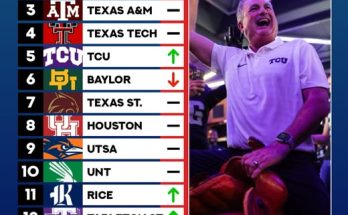**T.J. Watt Becomes the Highest-Paid Non-QB in NFL History with $40M Per Year Deal**
The NFL has long been a league where quarterbacks dominate the financial landscape, commanding the largest contracts due to their pivotal role in a team’s success. However, in a groundbreaking shift, Pittsburgh Steelers’ superstar edge rusher T.J. Watt has shattered the ceiling for non-quarterbacks, securing a historic four-year, $112 million extension that averages an unprecedented $40 million per year. This deal not only cements Watt’s place as the highest-paid defensive player in league history but also marks a watershed moment for the valuation of elite defensive talent in a quarterback-driven league.
Watt’s record-breaking contract comes after months of negotiations between the Steelers and the reigning Defensive Player of the Year. The 26-year-old pass rusher had been entering the final year of his rookie deal, and with his production skyrocketing over the past few seasons, Pittsburgh had little choice but to meet his market value. The new agreement includes $80 million in guaranteed money, ensuring Watt’s financial security while rewarding him for his dominance on the field. For context, Watt’s $40 million average annual salary surpasses the previous high for a non-QB, held by Los Angeles Rams defensive tackle Aaron Donald, who makes $31.6 million per year. It also edges out the highest-paid offensive non-quarterback, San Francisco 49ers tight end George Kittle, who earns $15 million annually—a staggering gap that underscores Watt’s unparalleled leverage.
The significance of this deal cannot be overstated. For years, defensive players have fought for recognition in a league that prioritizes offensive firepower, particularly at the quarterback position. The top 10 highest-paid players in the NFL are all quarterbacks, with Patrick Mahomes leading the way at $45 million per year. Watt’s contract bridges that gap, signaling a potential shift in how teams value game-changing defenders. His ability to single-handedly disrupt opposing offenses—racking up 15 sacks, 23 tackles for loss, and 41 quarterback hits in 2020 alone—proves that elite defensive talent can be just as impactful as a franchise quarterback.
Watt’s rise to the top of the NFL’s financial hierarchy has been nothing short of meteoric. Drafted 30th overall in 2017, he quickly established himself as one of the league’s most feared pass rushers, following in the footsteps of his older brother, J.J. Watt, a three-time Defensive Player of the Year. While J.J. paved the way for the Watt family’s NFL legacy, T.J. has carved out his own path, surpassing his brother in both accolades and earnings. His relentless motor, technical refinement, and uncanny ability to strip the ball—leading the league in forced fumbles in 2019 and 2020—have made him the centerpiece of Pittsburgh’s defense.
The Steelers, known for their defensive prowess, have a long history of rewarding their homegrown stars. From Mean Joe Greene to Troy Polamalu, the franchise has consistently prioritized retaining defensive legends. Watt’s extension follows that tradition, ensuring that one of the league’s most dominant defenders remains in black and gold for the foreseeable future. However, the deal also raises questions about the Steelers’ salary cap flexibility. With quarterback Ben Roethlisberger on a one-year deal and key players like Minkah Fitzpatrick also due for extensions, Pittsburgh will need to carefully manage its finances to remain competitive.
From a broader league perspective, Watt’s contract could set a new benchmark for defensive players. Cleveland’s Myles Garrett, Chicago’s Khalil Mack, and Las Vegas’ Maxx Crosby are among the elite pass rushers who may now push for similar deals. Agents representing top-tier defensive talent will undoubtedly use Watt’s contract as leverage in future negotiations, arguing that if Pittsburgh is willing to pay $40 million annually for a game-wrecker, other teams should follow suit. This could lead to a ripple effect across the league, with defensive salaries rising to reflect their increasing importance in an era where stopping high-powered offenses is more critical than ever.
Critics of the deal may argue that allocating such a massive portion of the salary cap to a non-quarterback is risky. In a league where teams like the Kansas City Chiefs and Tampa Bay Buccaneers have found success by investing heavily in offensive weapons around their quarterbacks, the Steelers are betting big on defense. However, Watt’s impact is undeniable. His ability to take over games—evidenced by his game-sealing strip-sack against the Baltimore Ravens in 2020—proves that a transcendent defensive player can be worth every penny.
Beyond the financial implications, Watt’s contract is a testament to his work ethic and leadership. Despite holding out during training camp to secure the deal, he returned without drama and immediately resumed his role as the heart of Pittsburgh’s defense. His teammates and coaches have long praised his relentless preparation and competitive fire, traits that have made him one of the most respected players in the league.
As the NFL continues to evolve, Watt’s record-breaking deal may be remembered as a turning point in how teams value defensive superstars. While quarterbacks will always command the largest contracts, Watt’s $40 million per year proves that elite defenders can now sit at the same financial table. For the Steelers, the investment is a no-brainer—locking up a generational talent who can anchor their defense for years to come. For the rest of the league, it’s a wake-up call: defensive players are no longer second-class citizens in the NFL’s economic hierarchy.
In the end, T.J. Watt’s historic contract is more than just a payday—it’s a recognition of his dominance, a reward for his relentless pursuit of greatness, and a landmark moment for defensive players everywhere. As he takes the field this season, the weight of expectations will be heavier than ever, but if his past performance is any indication, Watt is more than ready to prove he’s worth every dollar.



